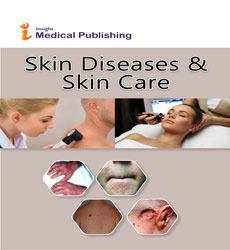Abstract
Hair Loss and Hirsutism Management
Alopecia refers to hair loss. It can D the scalp or other parts of the body, and can be localized or widespread. It may be due to hair shedding, poor quality hair, or hair thinning and can be scarring or non-scarring in nature. Hair grows on most parts of the skin surface, except palms, soles, lips and eyelids. Hair thickness and length varies according to site. Vellus hair is fine light in color, and short in length. Terminal or androgenic hair is thicker, darker and longer. A hair sh– grows within a follicle at a rate of about 1 cm per month. It is due to cell division at the base of the follicle (hair bulb). He cells produce the three layers of the hair shD– (medulla, cortex, cuticle), which are essentially made of the protein keratin. Hair growth follows a cycle. However, these phases are not synchronized and any hair may be at a particular phase at random. e hair cycle can be divided into 3 main phases: nagen: s is actively growing hair. Catagen: Transition phase of 2-3 weeks when growth stops and the follicle shrinks. Telogen: Resting phase for 1-4 months, up to 10% of hairs in a normal scalp. Over shedding is known as telogen effluvium It occurs 2-6 months er an inciting event that stops active hair growth. Telogen effluvium is commonly caused by following reasons: Fever, weight loss, pregnancy Surgical operation, illness or psychological stress Medications (contraceptives, anticoagulants, anticonvulsants) Others (unknown) Shedding can persist for years (chronic telogen effluvium. Pattern hair loss is due to hormonal influence and increases with age. Male pattern alopecia D ects vertex and temporal scalp. Female pattern alopecia Defects the anterior scalp. Hair she defects can be congenital, or acquired due to disease or injury. Hair shD– abnormalities can be diagnosed by dermatoscopy or more intensive examination of the hair. Light therapy is safe and used to treat androgenetic alopecia. It is postulated to enhance blood flow in the scalp. It has also been suggested to improve the wound healing process in post hair transplant patients and hasten hair growth. However, the evidence is weak. A multicenter trial reported that male patients with androgenic alopecia exhibited a statistically significDnt increase in average hair density. Similar results were shown in a study comprising women with androgenic alopecia [9]. In a second study of 103 males and 122 females with pattern alopecia that completed the study, HairMax LaserComb (with 12, 9 and 7 beams) was reported to result in increase in terminal hair density versus trial subjects in the control group [10]. Ongoing trials are investigating the efficDcy of other light therapy devices in various types of alopecia [11]. Lifestyle changes Good scalp care to keep hair clean with stimulating massage, and the safe use of a hair dryer. Maintaining exercise and stress control, eating healthily food rich in protein, vitamins and minerals, like iron. One should avoid birth control pills, anabolic steroids, alcohol and smoking. Finally cDmouflDge with wigs and hair pieces. Surgical and injectable Surgical treatment for hair loss will not be discussed in this paper. His can be referred from Sattur SS. Several injectable can be used including: Platelet Rich Plasma (PRP) This work is partly presented at International Conference on Aesthetic Medicine and Cosmetology, May 21-22 2018‚Singapore Vol.4 No.3 Extended Abstract Skin Diseases & Skin Care 2019 Finally, we should look into PRP. He use of platelet growth factors to stimulate hair growth and reduce hair loss has achieved quite Efective results for both androgenic alopecia and alopecia areata, noted in small scale studies. We await large scale randomized controlled studies on the use of this modality. is area is indeed promising, but it is clear that with the lack of intellectual property potential, pharmaceutical companies would hesitate to fund a large clinical trial. Botulinum toxin He science behind this is the relaxation of scalp musculature, hence decompressing blood vessels in the scalp and increasing oxygen delivery. DHT is converted to estradiol in oxygen rich medium. About a 60 week study has reported increase in hair growth and reduction in hair loss in males with androgenic alopecia. He is can be Metformin or rosiglitazone can be prescribed to women with polycystic ovarian syndrome. Hormonal treatment with antiandrogen medicines may be used for women with hirsutism. Effects may take 6-12 months, and the medicine needs to be continued for years. Spironolactone can reduce excessive hair growth. A synergistic effect is achieved when combined with the contraceptive pill. Combined birth control pills that contain estrogen and progesterone: cyproterone are effective Side effects include mood swings, loss of libido and weight gain. Conclusion In the realm of hair loss, low level light therapy is a fascinating area deserving of further research. With the interest in non-invasive treatments growing, personally I believe combination therapy with minoxidil, anti-androgens and low level light therapy would be the gold standard treatment for hair loss in the future. As for hirsutism, it is not yet possible to prevent a genetically predetermined cause. Insulin resistance associated with obesity can be reduced by diet and lifestyle changes. Prognosis is dependent on the cause. He most common types of excessive hair growth is permanent. Hirsutism has a tendency to worsen with age. Keywords: Alopecia; Hirsutism; Androgenisation; Trichotillomania; Hyperprolactinaemia
Author(s):
Chang D
Abstract | PDF
Share this

Google scholar citation report
Citations : 94
Skin Diseases & Skin Care received 94 citations as per google scholar report
Abstracted/Indexed in
- Google Scholar
- Publons
- Secret Search Engine Labs
Open Access Journals
- Aquaculture & Veterinary Science
- Chemistry & Chemical Sciences
- Clinical Sciences
- Engineering
- General Science
- Genetics & Molecular Biology
- Health Care & Nursing
- Immunology & Microbiology
- Materials Science
- Mathematics & Physics
- Medical Sciences
- Neurology & Psychiatry
- Oncology & Cancer Science
- Pharmaceutical Sciences
